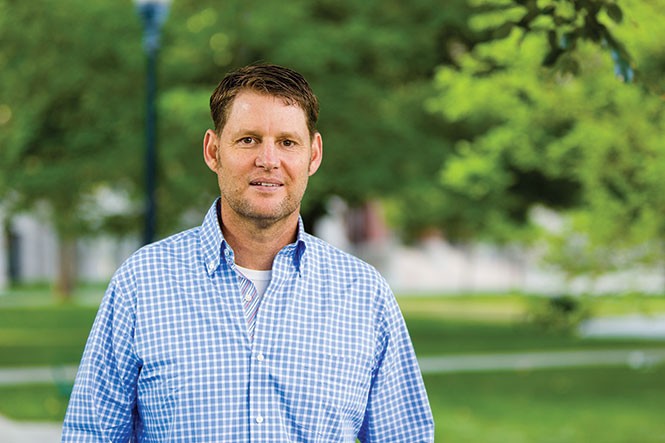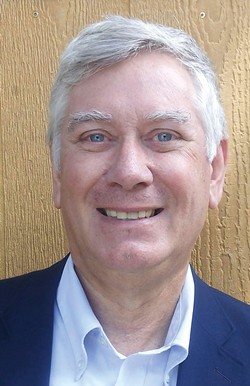
- Dave Robinson
This story was updated July 27, 2015
Oftentimes elections generate "also rans"—the lesser well-known candidates who, let's face it, can sometimes seem like single-issue loons: ("Rent's too high!" "Liberate the lizard people!" etc.) They can be like that party crasher who shows up unanounced at midnight and starts picking fights and smashing plates, while everyone else wonders, "Who the hell is that guy?"
In this year's Salt Lake City mayoral race, however, the wildcard candidates are as serious and experienced as more well-known contenders. Dave Robinson, a native Utahn who has worked as a ranch hand but now owns a small construction and consulting company, says that he'd like to see more done to protect the Cottonwood canyons and the city's watershed.
George Chapman is a longtime community organizer who wants more transparency in the city administration and the way it communicates with residents and wants public-transit authorities to focus on expanding bus service rather than investing in costly transit projects.
Both Robinson and Chapman, as it turns out, stand to make an already contentious race even more interesting to watch.
Dave Robinson: "A great little city"
Dave Robinson has worked as a hand on a Utah County sheep farm, a horse breeder in Texas and Ohio and, at 47 years old, now owns a small construction and consulting company. But he'd like his next job to be mayor of Salt Lake City.
If Robinson manages to wrangle a seat in the mayor's office, it would be his first political perch. "Thought I would just start with the mayor," he says.
Although a long shot for the job—Robinson has done little fundraising to compete with the moneyed forces fueling the campaigns of former state Rep. Jackie Biskupski, and incumbent Salt Lake City Mayor Ralph Becker—Robinson has honed in on several key areas of interest where he says Becker, who is eyeing a third term, has failed the city.
Chief among these are the land-use issues of the Wasatch Range's canyons, which provide the lion's share of Salt Lake Valley's drinking water and are under constant threat of development. Robinson—whose consulting firm, SS Consulting LLC, represents several of the private landowners in the canyons—says that, rather than focusing its resources on acquiring private property in the canyons and setting it aside as public land, the Becker administration has resorted to litigation.
Robinson says Becker's hand has guided the Mountain Accord process, an ambitious multi-year effort to draw up a plan for the central Wasatch's future, which has resulted in visions for a train line up Little Cottonwood Canyon and a tunnel connecting Little and Big Cottonwood canyons.
"I believe that Mayor Becker has failed in his administration to protect the watershed, protect open space and protect the backcountry," Robinson says.
A more plausible transportation solution for the Wasatch, Robinson says, is increased bus service during the winter. And when it comes to resolving conflicts between private landowners and land managers, Robinson says rather than dropping coin on the costly Mountain Accord process, which has already run up a multimillion-dollar tab, the money should be spent on acquiring the land and protecting it.
According to Robinson, if the city took half of what it's spent on the Mountain Accord and lawsuits over the years, it could have purchased and protected 3,000 acres.
"Instead, they say that they're retiring close to 2,000 acres—it's nuts—through Mountain Accord," Robinson says.
As a man involved with the construction industry, Robinson also says some city-zoning ordinances must be tweaked to help facilitate construction of affordable housing. One example of where the city's laws are nonsensical, he says, is an ordinance that allows accessory dwellings to be constructed atop garages, but restricts the height of garages to 9 feet—making it impossible to build the apartment.
Robinson, who grew up in American Fork and served a mission for The Church of Jesus Christ of Latter-day Saints, came out as gay in his late 30s.
Even with the recent onslaught of rights for same-sex couples, Robinson says he believes advocacy organizations need to bolster resources in a crucial area: sexually transmitted diseases in the LGBT population.
For example, he says as the country set its sights on marriage equality, the rise in mobile apps offering "anonymous on-demand sex" rose significantly. But the hours of STD testing at the Utah Pride Center remained stagnant. As mayor, Robinson says he would encourage gay-advocacy groups to expand their services.
Robinson would also like to see the city's Pride Parade improved by luring more of the city's quality gay talent to perform and participate.
Presently, Robinson says, there are no gay-specific winter games, the market for which, he says, is robust and could provide substantial economic gain in Utah. As mayor or not, Robinson has already made some progress on making such an event a reality. "We're actually preparing to roll out the queer games that will be anchored here in Utah and that, over the years, will provide hundreds of millions of dollars for the state of Utah," he says.
During the city's large conventions, such as the Outdoor Retailer show, a drought of hotel beds consistently plagues the city.
It is perhaps not surprising that as an owner of My Host Housing, a house-sharing business aimed at bridging this hotel-bed gap during large conventions that Robinson would like to see Salt Lake City embrace the shared economy, alongside with building new hotels.
"I think we have a great little city," Robinson says. "I think this city has a greater potential for a sense of community than anywhere I've lived, and I believe that comes from the tone that is set from the mayor's office and city leadership." (CF)

- George Chapman
George Chapman: "That guy at all the public meetings"
As proof, Chapman proudly shows off a handout he picked up from a March meeting of the Wasatch Front Regional Council. While many politicians speak in "all of the above" terms when it comes to public transit development and projects, one handout he shows a reporter, titled "2015-2040 Transit Cost Summary" shows a plan for 32 percent of public-transit monies to be spent along the Wasatch Front going to new projects, 62 percent to continuing existing services and a minuscule 6 percent devoted to "Local Bus & Rail Service Expansion." He points to long-term plans in the capital city for three new downtown rail lines, including the Sugar House Streetcar expansion that could cost upward of tens of millions of dollars each.
"That could be used for 20 or 30 new bus lines," Chapman says.
As a devotee of public meetings, Chapman says he too often has seen how those in power talk quietly about big plans and only seem to truly engage with citizens as an afterthought. Chapman says he's been to more than one community-council meeting where a city representative would ask community members for feedback on a project only after the project was well on its way to completion.
"When you see everything I see when you go to these meetings, you just want to stop it and wring somebody's neck and say, 'Let's get real!'" Chapman says.
Previous to becoming a public-meeting gadfly and now dark-horse mayoral contender, Chapman worked professionally as an engineer. He got his degree from the University of Utah before relocating to San Diego to work as an officer in the Navy. He served during the final days of the Vietnam War, where his naval group helped rescue refugees from the war-torn nation after the fall of Saigon. Working in the military during the Cold War, he learned to despise rising hawks like former Vice President Dick Cheney and Secretary of Defense Donald Rumsfeld before it was cool to do so.
"They were idiots back then, too," Chapman says.
Chapman left the service and worked in the private sector, including for several cell-phone companies. He later returned to Utah, where he threw himself into into public meetings and political organizing. While he enjoys working at the grass-roots level, he feels now he has to challenge incumbent Becker to effect lasting change.
Increasing bus service for early risers and late-night workers is key for Chapman.On the transit front, he also questions plans to place high-density developments adjacent to the Sugar House Streetcar line, that will tower over single family homes. When it comes to funding, he says the city could do well to invest in smarter, more responsive traffic signals for busy thoroughfares. It would not only ease congestion, it would improve air quality by not keeping motorists idling at red lights.
He also faults the mayor for the homeless situation, saying that Becker's lack of leadership has turned the homeless shelter into a dangerous place that many homeless people avoid for fear of violence. Chapman can attest to that personally, as he recently discovered that the homeless occasionally camp out in the backyard of his home near 1100 East and 1300 South.
"We didn't know until we found little piles of poop there," Chapman says. He doesn't favor relocating the shelter, but believes in a multi-pronged approach that would include social workers, an improved campus on the site of the shelter and increased police foot patrols.
"The drug dealers can't seem to be stopped, but you can stop the drug buyers if you have officers walking out there ready to stop anyone looking to buy," Chapman says.
Chapman has many beefs with Becker but most stem from his feeling that Becker is not being transparent in his dealings and is working unilaterally without a robust civic process. Instead of raising taxes that would require public hearings, Chapman says the mayor has taken to increasing fees. He points to a March 2015 council staff report that shows the Mayor's Office seeking "significant" lighting fee increases for a number of neighborhoods, compared to 2014, with fee increases that "range from 2.88 percent to 151.96 percent" in 12 city neighborhoods.
"That's an easy way to raise money so they can say, 'We didn't raise taxes,' " Chapman says. He also challenges the city's Open City Hall website as a disingenuous way of interacting with citizens.
"I contend that face-to-face interacting with people in real time, right there, works better," Chapman says. Even he is if elected, he says he wouldn't stop making the rounds at neighborhood-level public meetings.
"I'll continue to go to my community council meetings. I want to work for Salt Lake City's citizens and businesses," Chapman says. "I don't think I'm going to be sitting on a throne at City Hall."